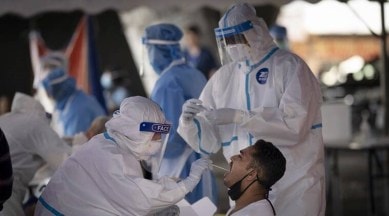Stay updated with the latest - Click here to follow us on Instagram
Good herd immunity, no need to panic: Experts on BF.7
According to Dr Suman Singh, Director, Health Services, Chandigarh, the sample of the patient has been sent for genome sequencing and results are awaited.

The current surge in Covid-19 infections in China is believed to be caused by the BF.7 sub-variant of Omicron, has prompted precautionary measures in healthcare institutions across the country, including Chandigarh.
In Chandigarh, the administration has swung into action, mandating government hospitals to conduct Covid RT-PCR test for patients with flu-like symptoms, as well as patients being admitted for surgery, those with co-morbidities, and all those being admitted to the emergency wards and through outpatient departments.
monthly limit of free stories.
with an Express account.
“We have sensitized our staff to tell people to take precautions, come for testing in case of any symptoms, and also be prepared for any situation. Our RT-PCR lab in GMSH-16 is completely functional, and when required, we will increase testing. Right now, there is no cause for worry,” said Dr VK Nagpal, medical superintendent GMSH-16 and Chandigarh’s joint director of health.
Experts said that not many cases of the Chinese variant of Covid had been reported from India yet, so it was a wait-and-watch situation. Dr Digambar Behera, Padma Shri awardee and former head of the Department of Pulmonary Medicine, PGI, Dean (Research), and current Director, Pulmonary Medicine at Fortis Hospital Mohali, said, “Change of strains and their virulence can occur anywhere, particularly for aged and comorbid subjects. Unlike in China, our vaccination is quite widespread and more effective. However, the new variant is a matter of concern for us as well because of international and cross-country travel. Moreover, we expect the strain to be milder and less virulent, though we need to observe it as we do not have much experience with this virus yet — only a few cases have been reported from our country. We need to be more cautious and should observe Covid appropriate behaviour, like avoiding crowds, wearing masks, and completing vaccination at earliest.”
On Thursday, one Covid case was reported from Chandigarh, the patient being identified as a male from Sector 11 who tested positive before being taken in for surgery at Max Hospital, Mohali. According to Dr Suman Singh, Director, Health Services, UT, the sample of the patient has been sent for genome sequencing and results are awaited. “So far, Omicron has been the predominant variant since the third wave,” Singh said.
Professor Madhu Gupta of the Department of Community Medicine and School of Public Health at PGI, said that India had covered almost the entire population with vaccine doses — including some even getting a booster shots.
“Covid restrictions were eased for almost two years and natural infections have almost infected everyone in India. We have good herd immunity in the population. So, we might not face a China-like situation in India. In China because of the zero Covid policy, they did not let the natural infections spread earlier. Therefore, a part of their population was left without immunity either by vaccines or naturally. So, they are now seeing an increased number of cases after the lifting of restrictions. In India, we need to be vigilant regarding the new Omicron variant BF.7 because of its virulence and severity. We must follow Covid appropriate behaviour, but there is no need to panic for India,” said Gupta, who is also the principal investigator for the clinical trials of the Oxford Covid-19 vaccine
Dr Rakesh Kochhar, former Head of the Department of Gastroenterology at PGI, said that the new Covid variant was more infectious, spreads faster, and has a shorter incubation period.
“In China, only half the population is vaccinated, and their vaccines are not as effective as the Indian ones. Our vaccines have high efficacy. In India, we have natural immunity and vaccine immunity. In China, the immunity against omicron must be low. Herd immunity is important. We should be cautious, genome sequencing is important, and we must know what variant is present. Wear masks in crowded places and take all precautions. Doctors are still wearing masks. We must have the booster shot, it is important, as it provides immunity,” added Kochhar.
Commenting on the current situation in China and its impact here, Dr PVM Lakshmi, professor of Community Medicine and School of Public Health, PGI, said that a lot depended on cross-immunity between the strains of Omicron which circulated in the Indian population. “The B.F7 strain circulating in China is highly contagious,” Lakshmi said.
“There is no need to panic, as we have hybrid immunity as well as immunity because of vaccination, which can prevent serious disease, hospitalisations, and mortality. Patients with co-morbidities, high-risk patients, and older people need to be extra cautious and the virus is intelligent, as we are seeing by the huge numbers being reported from China. Genome sequencing is important to know the strain and we need to wear our masks, avoid large gatherings and observe precautions,” sums up Prof. Sanjay Jain, Head of the Department of Internal Medicine, PGI.